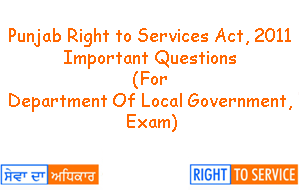
Punjab Right to Services Act, 2011 Important Questions (For Department Of Local Government, Exam)
Punjab Right to Services Act, 2011 Important Questions (For Department Of Local Government, Exam)
What is Right to Services Act ?
Ans- which guarantee time-bound delivery of various public services rendered to citizens and provides mechanism for punishing the errant public servant if they are is deficient in providing the stipulated services. The various services covered under this act are like issuance of caste, birth marriage certificate within a stipulated time. Hence, Right to Service legislation ensures delivery of time bound services to the public. If the concerned officer fails to provide the service in time, he will have to pay a fine. Thus, it is aimed to reduce corruption among the government officials and officials and to increase transparency and public accountability.
Note-Â Punjab enforced its Right to Services Act (PRTS Act-2011) on Oct. 20, 2011
How it works?
Ans- The common framework of the state legislations includes, granting of “right to public services”, which are to be provided to the public by the designated official within the stipulated time frame.
The public services which are granted as a right are generally notified through Gazette notification.
Some of the commonly provided public services, including issuing caste, birth, marriage and domicile certificates, electric connections, voter’s card, ration cards, copies of land records, etc., within the fixed time frame.
On failure to provide the service by the designated officer, the aggrieved person can approach the First Appellate Authority. The First Appellate Authority, after making a hearing, can accept or reject the appeal by a written order stating the reasons and intimate the same to the applicant. It can order the public servant to provide the service to the applicant
An appeal can be made against the order of the First Appellate Authority to the Second Appellate Authority, who can either accept or reject the application, by stating the reasons for the order and intimate the same to the applicant. It can order the public servant to provide the needed service to the applicant and/or can impose penalty on the designated officer for deficiency of service without any reasonable cause.
The applicant may be compensated out of the penalty imposed on the officer.
The appellate authorities has been granted certain Civil Court powers while trying a suit under Code of Civil Procedure, 1908, like production of documents and issuance of summon to the Designated officers and appellants. . It can order the public servant to provide the service to the applicant
What is the procedure under the Public Service Guarantee Act?
Ans- The applicant shall receive a receipt when he or she submits an application to the officer for desired service. The time begins from the date of submission which is mentioned on the receipt.
There is a fixed time for every officer to keep a file with him. If the officer in charge fails to provide the service in time, the applicant can approach the First and Second Appellate officers. They would instruct the officer concerned to provide the service.
In case of delay, the officer in charge will have to pay a fine as per provisions of the state concerned.
The Appellate officer can also be penalized if he fails to ensure the delivery of service. He/she shall also if failed to give any valid reason for non delivery of services.
The Act will be instrumental in curbing corruption on the lower levels bureaucracy. If implemented in good order.
Note- Making application under RTS is free of cost
How much penalty impose on the designated officer for deficiency of service without any reasonable cause according to Punjab RTS Act 2011.
Ans-  Officers failing to provide the services within the requisite time frame (varying from one day to 60 days) will face penalty lump sum amount of not less than Rs. 500 and cannot exceed Rs. 5000 on failing to provide service. In case the defaulting officer causes undue delay in rendering the services he can be made to pay a compensation of Rs. 250 per day but not exceeding Rs. 5000. The condition being the penalty can be imposed only after giving the opportunity of being heard to the defaulting officer. Also lastly a disciplinary action can also be initiated against the defaulting officer if considered necessary
Who are the Appellate Authorities and what are their functions?
Ans- Appellate Authority comes into action if the designated officer fails to provide the service within specified time. Appellate Authority may pass an order either accepting the appeal or directing the Designated Officer to provide service to the eligible person within such period as may be specified or reject the same in writing detailing the reasons for such rejection.
Note- 1st appellate has to dispose of the appeal within 30 days of its receipt and 2nd appellate has to dispose of the appeal within 60 days of its receipt. Grievance redressal mechanism is contained in the Rules which can be seen at “The Punjab Right to Service Rules 2011â€
Punjab Right to Service Commission (PRTSC) Body consisting of_______?
Ans- Punjab Right to Service Commission (PRTSC) consisting of 1 Chief Commissioner and 4 Commissioners has been constituted on Nov 23, 2011 to look after the effective implementation of the Act as the final appellate authority to hear revision applications against the orders of 2nd Appellate Authority.
Number of services provide and number of department cover under Punjab RTS Act 2011.
Ans- Number of services provide- 149Â Â 206
Number of Department cover- 11Â 23
Which is Nodal Department of Punjab RTS Act
Ans-Â Department of Governance Reforms
Important Provisions of the Act
Under Section 4 of the act there is a provision for services whereby the designated officer shall provide service to the applicant within a given time.
Under Section 7 of the act there is a provision for services whereby in case the application gets rejected then the person entitled to the service can move to the first appellate authority within 30 days of previous rejection.
Note-Â The appellate authorities have the same powers as that of the civil court while trying a suit under the Code of Civil Procedure, 1908
Under Section 9 of the act there is a provision for services whereby officer impose penalty if failing to provide the services within the requisite time frame and defaulting officer is liable to pay
In this Act, unless the context otherwise requires,-
(a) ‘Commission’ means a Commission constituted under section 12;
(b) ‘Designated Officer’ means an officer as notified under section 3;
(c) ‘eligible person’ means a person who is eligible for obtaining services notified under section 3;
(d) ‘First Appellate Authority’ means an officer who is notified as such under section 3; Short title and commencement. Definitions.
(e) ‘given time limit’ means maximum time to provide the service by the Designated Officer as notified under section 3;
(f) ‘prescribed’ means prescribed by rules made under this Act;
(g) ‘right to service’ means a right to obtain the service within the given time limit ;
(h) ‘service’ means any service notified under section 3;
(i) ‘Second Appellate Authority’ means an officer who is notified as such under section 3;
(j) ‘section’ means a section of this Act; and
(k) ‘State Government’ means the Government of the State of Punjab













Hey please recheck whether the services provided under prts 2011 are 149 or 206
Thanks for your concern, I have corrected Answer.
Currently, there are 206 services which have been notified in Punjab Right to Service Act, 2011 and these services are provided by 23 different departments
you are doing great work sir…. keep it up
thanks
sir how can i download practice test given by you..
ther ask for any code…?
how i get this?
waiting for ur reply..sir
reply soon……
password – punjabexamportal